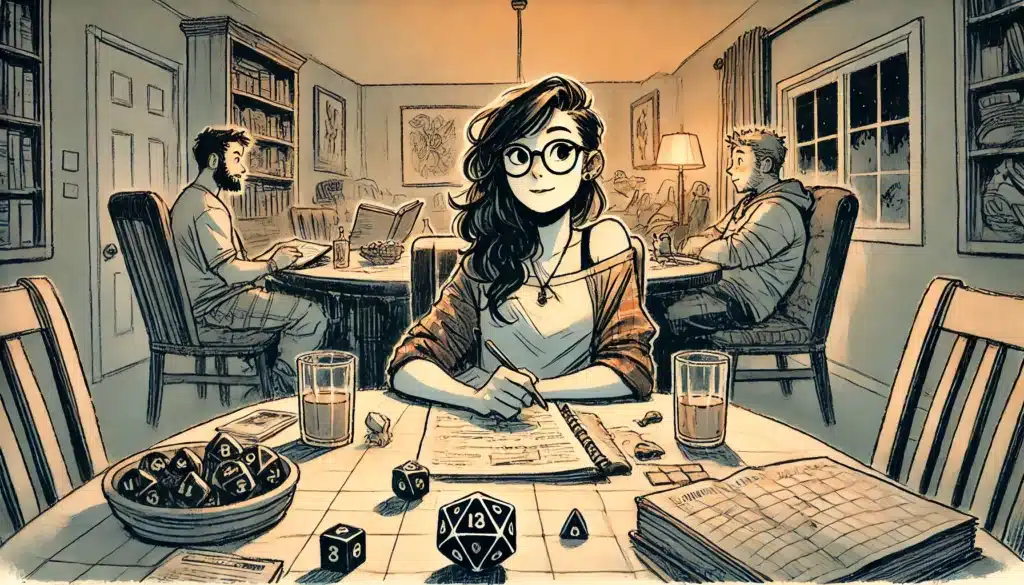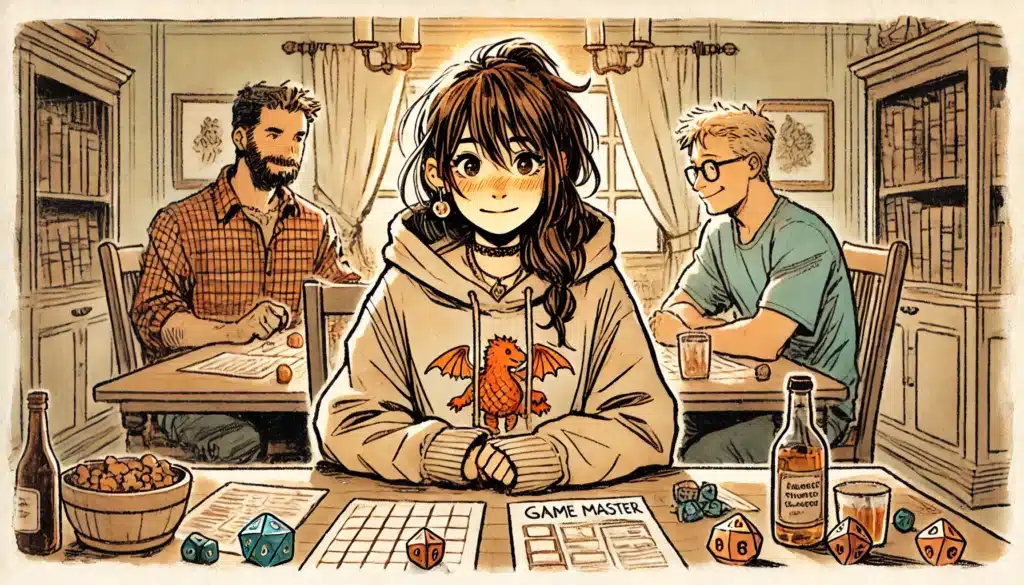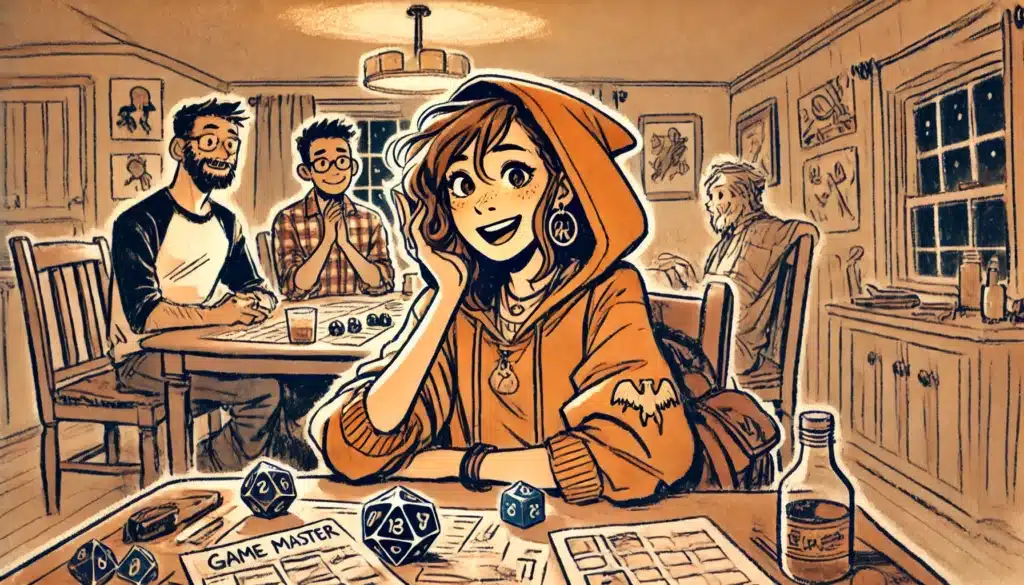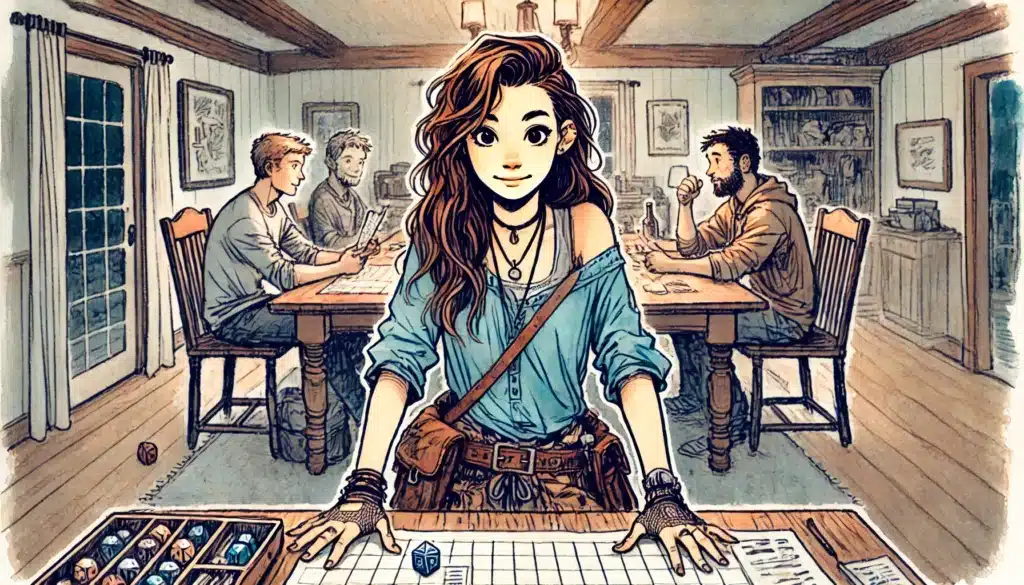There’s a particular thrill—and a healthy jolt of terror—that comes with deciding to run your very first tabletop RPG session. The Dungeon Master’s seat is equal parts director’s chair, conductor’s podium, and stage magician’s hat—filled with ideas, nerves, and the weighty feeling that everyone is looking your way. For new DMs, it’s easy to feel like you’re expected to know every rule, deliver Oscar-worthy performances, and masterfully steer the story—all at once. The pressure can build until the excitement gets tangled with nerves, especially when doubts about rules knowledge or performance anxiety begin to whisper in your ear.
Most beginners share the fear of messing up—a misread rule here, an overbearing story there, not using the right D&D character creator, or a moment where their improvisation skills run dry. Will you forget something important? Will you freeze if the players zig instead of zag? These worries are as old as roleplaying itself, echoed by every DM, from green rookies to seasoned storytellers. You might fret about keeping control, or feel compelled to pre-write every scene, secretly terrified someone will spot your inexperience.
If you’re new at this, let’s dispel a myth: great Dungeon Masters aren’t born, they’re forged—one clunky description or fumbled initiative order at a time. The secret ingredient of every fantastic DM is not perfection, but learning through play. Mistakes are baked into the process, and every misstep is a stepping stone to mastery. The stories that make D&D legendary often arise from unpredictable moments and happy accidents, not meticulous adherence to some invisible checklist.
This guide is here for you—not as a red pen-wielding critic, but as a supportive toolkit. We won’t sneer at your learning curves or pretend there’s one true way to run a table. Instead, we’re here to normalize those first (and second, and tenth) errors, then hand you ideas and advice for growing from them. If you come away more curious, more confident, and a little less afraid to take risks behind the DM screen, this mission is accomplished.
So take a deep breath, roll for initiative, and let’s turn the pitfalls of first-time Dungeon Mastering into levers for growth and epic play. Every session is a chance to build skills, create memories, and—above all—have fun with your friends.
Misunderstanding the Rules
One of the most common sources of anxiety for new Dungeon Masters is the fear that you don’t know enough rules. Maybe you’ve seen other DMs rattle off spell effects or cite obscure combat details from memory, leaving you worried that you’ll be exposed as a fraud if you stop to check a rulebook or—gasp—ask the table for help. The truth is, even longtime DMs don’t have every rule memorized, and the game is far too complex for any one person to serve as a walking encyclopedia.
Try my AI Tabletop RPG generators...and an extensive library of content!
While a grasp of the basics—combat, skills, some magic—is certainly helpful, much of your job rests in keeping the game flowing and fair. Rules are there to support play, not constrict it. If you stumble, pause, and double-check the book, that’s not a failure; it’s DM best practice. In fact, a well-timed house rule or on-the-fly decision can often keep the session moving when debate might bog things down.
The key is to think of the rulebook as a toolkit rather than a set of chains. Judgment, consistency, and communication matter far more than encyclopedic recall. If everyone at your table feels heard and the story marches onward, you’re already succeeding. Players would rather have a fun, fair adventure with occasional handwaving than a perfect legal document recitation for every encounter.
Mistakes on mechanics will happen. When they do—and they absolutely will—own them. Tell your players you’ll look it up, adjust next time, and keep things moving. When in doubt, decide, announce, and return to the story. Respect for your players and the flow of the game should always outrank rule obsession.
Commonly Misunderstood or Misapplied Rules for New DMs:
- Stealth & Hiding: When can a creature actually hide, who can see them, and what breaks stealth?
- Concentration Spells: How many can a caster maintain? What ends concentration?
- Bonus Actions: What actions count, and can you use multiple in a turn?
- Surprise Rounds: Who gets a turn, and how do you determine surprise?
- Opportunity Attacks: When and how do these actually trigger?
- Readied Actions: What’s required to set and trigger a readied action?
- Cover: What counts as half, three-quarters, and full cover for bonuses to AC and Dexterity saves?
- Spellcasting Components: When is a focus, component pouch, or free hand actually needed?
- Environmental Effects: How do difficult terrain, underwater combat, or darkness rules really work?
- Two-Weapon Fighting: Does it require a feat, what weapons qualify, and do you add modifiers?
- Movement and Attacks: Can you split movement before and after attacking?
- Grappling and Shoving: What are the correct contested rolls and armor/attack modifiers?
- Death Saving Throws: How are they triggered, what resets them, and what about advantage/disadvantage?
- Magic Item Attunement: Limits, process, and timing.
- Long & Short Rest Mechanics: Who regains what, and when?
- Initiative Ties: How do you resolve them?
Learning rules is a game-long journey, not a prerequisite for starting. Keep an open mind and encourage a table where questions are welcome. Admitting you’re unsure but willing to check (or make a quick, fair call) will earn trust, not mockery. Honesty, humility, and fair play are the real secrets to growing into a great Dungeon Master.
⚔️ Fantasy RPG Random Tables Books
Make life as a Gamemaster easier…
If you play Dungeons & Dragons, Pathfinder, or other fantasy RPGs, this
RPG random tables series
is packed with encounters, NPCs, treasure, and more. Available in eBook or print—either way, you’ll have a wealth of adventure ideas at your fingertips.

Overpreparing or Underpreparing
The new DM’s pendulum frequently swings between two extremes: scripting every detail until the adventure becomes a straightjacket, or arriving with nothing but a vague premise and hoping inspiration will strike. Both ends of the spectrum can cause headaches—burnout from weeks of detailed notes no one ever reads, or panic when your players derail your tenuous plans in the first ten minutes.
Overpreparing often looks like writing out entire conversations for every shopkeeper, mapping out every inch of a dungeon no one visits, or color-coding social hierarchies in a town that’s quickly left behind. It’s born of a desire to be ready, but ends up chaining the story to pre-written rails. On the other hand, underpreparing can mean not knowing key NPC names, getting derailed by forgotten statblocks, or presenting a world that feels hazy and disconnected because you’re making everything up on the fly.
The gold lies in the sweet spot: prepping loose, modular pieces that can be rearranged as the adventure veers. Focus on core encounters, major NPC motivations, and clear story beats—elements most likely to enter play. Fill in details only as they become necessary, trusting your players’ creativity to spark the rest. Invent a handful of fun rumors or plot hooks, rather than entire scenes, and let the table help you choose what becomes important.
Preparation isn’t about scripting—it’s about equipping yourself with the right tools and trusting yourself to wield them. The world should feel alive and reactive, not rigidly sculpted according to an invisible master plan. Let your prep empower flexibility, not strangle it.
Signs of Over- or Underpreparing as a New DM:
- Writing out pages of NPC dialogue word-for-word, but never letting the players ask their own questions.
- Forgetting monster stats mid-combat and constantly flipping through books.
- Lacking names for the first village, tavern, or barkeep, leading to player jokes about “Bob the Guard.”
- Drawing full dungeon maps—complete with puzzles and loot—for locations the players never visit.
- Leaving key NPC personalities, goals, or relationships undefined.
- Providing no description for important settings, making everything feel generic.
- Preparing intricate timelines or plot beats players ignore or break instantly.
- Stockpiling dozens of magic items, but not knowing who offers magic services in town.
- Over-relying on improv: world details feel inconsistent and players sense disconnection.
- Ignoring travel, logistics, or resting rules—leading to confusion or “magic healing” plotholes.
- Having no villains, secrets, or conflicts prepared for the adventure.
- Creating a cast of thousands—NPCs with elaborate backstories—none of whom see play.
- Having a notebook full of homebrew spells or artifacts, but no clear adventure hook.
If you spot yourself in either column, don’t panic. Try a modular prep system: jot down names, motives, and a few threads for each key area or NPC. Prep only what’s likely to matter this session. Leave blank spaces on your map, waiting for inspiration (or a player’s wild idea) to fill them in. Trust your group to co-create the world with you, and remember—the unexpected is where the best stories live.
A flexible DM is a resilient one. Let your players’ curiosity drive the adventure’s direction. You don’t need to predict every action, just be prepared to roll with their choices. The table’s collective creativity is your most valuable resource—use it.

Railroading the Players
It’s a classic new DM trap: you’ve poured heart and soul into your grand plot, and now you want to make sure your players experience every twist. You keep the story on track at any cost—ignoring oddball choices, gently (or not-so-gently) nudging decisions, or simply having an NPC insist the heroes “really must” follow your script. Welcome to the wild world of railroading, where player agency goes to die and adventures lose their magic.
You may feel a strong urge to maintain narrative “control.” After all, it’s your story, right? But the true strength of tabletop RPGs is collaborative storytelling. When you force the party down a single predetermined path, you miss out on surprising character moments, clever solutions, and the thrilling sense that anything could happen.
There’s a fine art to offering direction without closing doors. Great campaigns present meaningful choices, allowing players to genuinely alter the course of events. Sometimes that means adapting on the fly when the party sides with a villain, burns down your carefully prepped tavern, or abandons your main quest for a side plot. Those curveballs are gifts—they turn your game into something organic, alive, and unique.
Practice asking yourself: “What happens if they don’t follow my plan?” Instead of steering, try guiding—provide hooks, not hammers. Describe the world clearly and let player actions have real consequences. Build a campaign that reacts, not one that resists.
Railroading Habits to Avoid:
- Ignoring (or dismissing) player questions or creative ideas.
- Forcing the party to accept a quest, regardless of their stated interests.
- Narrating what a character feels or decides for the player.
- Blocking all alternative solutions to a problem except the “right” one.
- Using overly powerful NPCs to “correct” the party’s course.
- Shutting down backstory hooks or character-driven scenes.
- Instituting inescapable events that progress no matter what players do.
- Penalizing (or punishing) players for “wrong” choices rather than adapting.
- Changing die results to preserve your preferred story.
- Skipping or glossing over player-devised plans in favor of scripted events.
- Rushing past downtime or social scenes because they don’t advance your plot.
The heartbeat of an unforgettable campaign is mutual trust. Let players fail, succeed, and surprise you. Flexibility in the face of chaos isn’t a loss of control—it’s embracing what makes D&D magical. When you let the story breathe, everyone at the table—including you—gets to discover what happens next.
⚔️ Fantasy RPG Random Tables Books
Make life as a Gamemaster easier…
If you play Dungeons & Dragons, Pathfinder, or other fantasy RPGs, this
RPG random tables series
is packed with encounters, NPCs, treasure, and more. Available in eBook or print—either way, you’ll have a wealth of adventure ideas at your fingertips.
After all, you’re not spinning a story for your audience, but with them. Hand them the reins from time to time. The journey may be unpredictable, but it will be unforgettable.
Ignoring Player Feedback and Playstyles
It’s tempting to treat the DM’s chair as a throne—your world, your rules, your story. But the truest alchemy of tabletop roleplay happens when the DM’s vision harmonizes with the hearts and playstyles of the table. Too many new DMs run the campaign they want, oblivious to mismatched expectations or invisible signals of boredom, frustration, or disinterest from their players.
Learning to read and respond to the table is a master skill. Some groups want tense tactical challenges; others crave character drama, slapstick hijinks, or pulpy adventure. Ignoring this feedback can create sessions where no one feels truly engaged—each player feeling as if they’re watching someone else’s story unfold, instead of living out their own.
Session zero exists for a reason: open the lines of communication before dice ever hit the table. Use safety tools, talk about tone, and regularly check in with your players. Is the pacing too slow? Too deadly? Are people getting chances to use their favorite skills? Encourage honest feedback—during and after games—with an open mind and a thick skin.
Adapting doesn’t mean surrendering your authority: it means demonstrating respect, curiosity, and a willingness to maximize fun for everyone involved.
| Player Type | What They Value | How to DM for Them |
|---|---|---|
| The Strategist | Tactical challenges | Offer meaningful combats, puzzles, and complex scenarios. |
| The Roleplayer | In-character storytelling | Provide opportunities for dialogue, backstory, and immersion. |
| The Explorer | World discovery | Populate your campaign with lore, maps, and curious secrets. |
| The Instigator | Causing chaos | Allow for wild plans and react dynamically to their choices. |
| The Power Gamer | Gaining strength/equipment | Incorporate loot, leveling, and opportunities for growth. |
| The Storyteller | Narrative progression | Keep a strong plot thread and let choices influence outcome. |
| The Supporter | Group cohesion/fun | Foster teamwork and spotlight everyone at the table. |
Watch what lights up your players. Laughter, excitement, intense planning—these are signals you’ve hit the magic spot. If the table’s energy dips, don’t take it personally; see it as a prompt to try something new. Being adaptive and attentive is the mark of a great DM.
Adjusting course doesn’t mean giving up control. It means providing an environment where every player gets to shine, and the shared story is richer for it.

Fearing Improvisation
The most universally shared DM nightmare? The party veers completely off-script, and suddenly, your lovingly prepared notes are worthless. New DMs often freeze at these moments, scrambling for names, places, stakes. Improvisation can feel like a high-wire act without a net, but it’s actually just storytelling in real time—the muscle every DM needs to exercise.
Improvising doesn’t mean everything must be made up on the spot. Instead, it’s about piecing together familiar parts in novel ways. Maybe you change a villain’s name and use the description you planned for another NPC. Maybe you drop in a mysterious cave because you’ve got dungeon notes left over. Use environmental details broadly; “the market square smells of cinnamon and rain” works even if you haven’t mapped every stall.
Behind the DM screen, you’re allowed a little mystique. Roll a die, take a pause, and focus on describing what matters most. If you blank, let the party ask questions—often their ideas are better than yours in the moment. Trust yourself and, most of all, remember that your players aren’t measuring you against some invisible perfection.
Improv Hacks and Tips for New DMs:
- Keep a list of random names and swap them when needed.
- Flip a forgotten or old NPC into someone new.
- Use generic descriptions for locations until details are needed.
- Roll on random tables for encounters, treasures, or twists.
- Ask your players to help describe the setting or an NPC.
- Recycle unused dungeon rooms or plot hooks.
- Turn a failed plan into a new complication or opportunity.
- Use “mystery objects” or vague rumors until you commit to an answer.
- Throw in a surprise event if the party seems stalled.
- Mirror an antagonist’s motivation from a PC’s backstory.
- Change an NPC’s link or part based on last session’s events.
- Use ambient sounds or smells to make a place feel alive instantly.
- Have a few generic monsters or statblocks ready for any fight.
- If unsure, roll a die and let randomness decide.
- Lean into “yes, and…” or “no, but…” style responses to build momentum.
Improvisation is a muscle—weak at first, but stronger with practice. You’ll trip, stammer, and feel unprepared plenty of times. That’s how every DM sharpens this skill. Your players will remember the tension, relief, and excitement you conjure, not the moments you hesitated or fumbled.
Try my AI Tabletop RPG generators...and an extensive library of content!
Fail boldly, ask for input, and let yourself be surprised. The best memories are the ones nobody saw coming.
Letting the Game Drag
Some session moments crackle with energy—combat is tight, banter is sharp, players are leaning in. Others sputter and stall, lost in a maze of overlong battles, interminable travel scenes, or endless shopping excursions that feel like filling time instead of driving the narrative. New DMs especially can find it tricky to spot and fix these pacing issues.
Too many slow rounds, excessive dice rolling, or prolonged decision-making can drain the table’s attention. Dead-end exploration or scenes without clear stakes can leave players disengaged and looking at their phones. On the flip side, glossing over critical choices or skipping necessary downtime can make the story feel rushed and artificial.
The key is to monitor your table’s energy. If conversation lags, if nobody seems excited, or if the story isn’t advancing, it may be time to step in. Switching up the pace is an art—sometimes all you need is to summarize a scene, throw in an unexpected guest, or simply ask the players what they want to do next.
Remember: as DM, you’re not just telling a story—you’re conducting a symphony, knowing when to slow for tension and when to soar.
Pacing Fixes for When Things Slow Down:
- Switch from round-by-round to narrative time for travel or downtime.
- Offer a summary of uneventful scenes (e.g., “Two days pass with quiet rain…”).
- Drop in a new NPC to shake things up or provide a hint.
- Flash forward to the next important scene or encounter.
- Cut out unnecessary dice rolls for routine tasks.
- Have a rival or monster interrupt with a sudden complication.
- Encourage players to declare their intentions, then move on.
- Use in-game rumors to prompt a new quest or opportunity.
- Set a timer for planning or shopping scenes.
- Call for a group decision rather than resolving everything individually.
- Lean into environmental hazards or time pressures to create urgency.
- Ask the table directly: “Are you ready to move on, or do you want to explore more?”
It’s never a mistake to fast-forward, skip, or close a scene that’s run its course. A great session moves like a novel or film—peaks and valleys, quick cuts, dramatic pauses, and well-timed transitions. The tools to fix pacing are at your fingertips.
Let your narrative breathe, but don’t be afraid to turn the page. Your players will thank you for keeping things vibrant, memorable, and fun.

Final Thoughts on Early DM Mistakes
Every Dungeon Master’s origin story brims with awkward moments, laugh-out-loud blunders, and unexpected victories snatched from the jaws of chaos. Fumbled rules, nervous stuttering, sessions that lost the plot—these are the true milestones of every DM’s growth. Far from scars, they’re the foundation stones of your creative voice and confidence.
Mistakes are the secret spice that give every campaign its unique flavor. Sometimes the wildest, most enduring stories spring from scenes that veered off the rails—a dropped die, a botched rule, a wild improvisation made out of desperation. These imperfections aren’t shameful; they’re the soul of what makes RPGs memorable and authentic.
Experimentation is your birthright as a DM—try new things, borrow from others, take risks, fall flat, and get back up again. Tools and advice are the wind at your back, not the rigid rails of your journey. Ask for help, collaborate, and learn from your players as much as they learn from you.
Above all, remember that Dungeon Mastering is learned through doing. No book, podcast, or blog post will truly make you ready for every scenario. Confidence comes from experience—session after session—growing stronger and more playful with every roll of the dice.
The most valuable skill in a DM is not technical expertise, but the curiosity to keep learning and the heart to care about your players’ fun. Every error, every “I’ll fix that next time,” is a badge of honor. Welcome to the club—now go make some glorious, beautiful mistakes. Your table is waiting.




